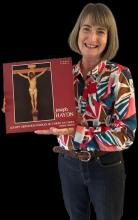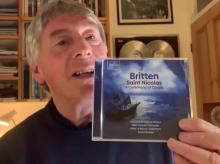As we prepare for the summer 2025 concert, here are my personal reflections on the experience of singing with Royston Choral Society.
Music has always been part of my life, starting with piano from a young age, working through the grades, teaching myself the guitar, then taking up the opportunity to have cello lessons so that I could play in orchestras.
Singing was something that took off in my mid-forties when I joined a small chamber choir in my local village, where I learned singing basics like how to breathe, how to produce an expressive sound, and gradually gained confidence in my voice and ability to hold a line against the other singing parts. I also enjoyed the chance to sing in many different music genres including renaissance, classical, romantic, sacred, jazz and pop.
Since then I have sung with quite a few different choirs in Sussex, Essex and South Cambridgeshire. Finding the right choir to join has been a major factor whenever we’ve moved to a different area. For the past five years I have been singing with larger choral societies tackling some of the bigger works of the choral repertoire.
I joined Royston in September 2024, and was pleased to find a good quality choir near to where I now live. The first concert in the Autumn term comprised works by Faure, Parry and Britten, then in the Spring we tackled Bach’s St Matthew Passion, sung in German!
Now for the Summer concert we are going back still further in time to the music of Purcell, in particular, Dido and Aeneas, one of the first English operas to be written.
So why do I enjoy singing? For me the benefits of singing in a choir are many: it’s enjoyable, it’s educational, it can be challenging, it’s sociable, and it’s healthy for mind and body.
 Royston Choral Society
Royston Choral Society









